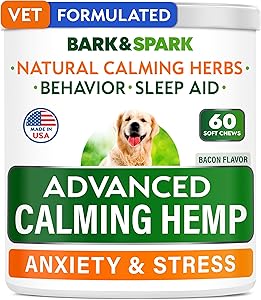If you click on links we provide, we may receive compensation.
Does your dog struggle with fireworks or thunderstorms? Or does car travel induce horrible anxiety? Phobias and anxieties are more common than you may think in dogs and as much as we can do to comfort them with management and support, sometimes pharmaceutical intervention can be an excellent tool in the toolkit for relieving this stress. Your veterinarian can offer a few different drug options, and one of them is trazodone. However, for mild to moderate anxiety, natural options like BARK&SPARK Advanced Calming Hemp Treats may provide relief. Read on to find out more about trazodone for dogs, and if it might be the right medication for yours.

What Is Trazodone for Dogs?
Trazodone is a medication commonly used in dogs to treat anxiety and stress. It acts as a serotonin antagonist and reuptake inhibitor (SARI), increasing serotonin levels in the brain to alleviate anxiety and promote relaxation. It’s often prescribed for separation anxiety, fear of loud noises, and anxiety related to veterinary visits or travel.
Main Uses of Trazodone for Dogs
Trazodone is most commonly used to treat phobias and anxiety in dogs, however, it can also be useful in dealing with cases of compulsive behaviors, barking, and sometimes aggression. Trazodone allows your pet to stay calmer during situations they normally find stressful.
It is commonly prescribed for dogs whose owners want to keep them calm for visits to the vet or dog groomers, or when they know fireworks will likely be set off locally. Alternatively, if people are finding that their dog is struggling during the daytime when they leave for work, trazodone can help their dog with separation anxiety.
Another regular use of trazodone for dogs is after surgery when they might struggle to keep calm but need to be confined to cage rest in order to recover properly and heal.
Dogs can find traveling very stressful if they are not accustomed to it, so trazodone can be given to your dog before a long car journey or plane ride, in order to relieve their anxiety.
As well as for specific short-term events, trazodone can also be given for the long-term management of anxiety as well. For this, trazodone is administered on a daily basis over multiple weeks to build up the full effect. If your dog suffers from these phobias or anxieties, seek advice from your veterinarian to see if trazodone could help.
How Is Trazodone Given?
Trazodone is given orally in either tablet or liquid form. It can be given with food or on an empty stomach, however, if giving it before food induces vomiting, we advise trying to give it with food instead.
Trazodone Dosage for Dogs
The trazodone dosage for dogs can vary and your veterinarian will advise you on what dose to start with based on your dog’s specific circumstances and size. The dosage range goes from 1.7 to 9.5 mg/kg orally every 8 to 24 hours. Your veterinarian will usually start your dog off at the lower end of the scale and gradually taper them up as needed.
Below is a table illustrating how much trazodone you can give your dog depending on how much it weighs.
| Dog Weight (lbs) | Dog Weight (kg) | Low Dosage (in mg) | High Dosage (in mg) |
| 10 | 4.5 | 7.65 | 42.75 |
| 20 | 9.1 | 15.47 | 86.45 |
| 30 | 13.6 | 23.12 | 129.2 |
| 40 | 18.1 | 30.77 | 171.95 |
| 50 | 22.7 | 38.59 | 215.65 |
| 60 | 27.2 | 46.24 | 258.4 |
| 70 | 31.8 | 54.06 | 301.1 |
| 80 | 36.3 | 61.71 | 344.85 |
| 90 | 40.8 | 69.36 | 387.6 |
| 100 | 45.4 | 77.18 | 431.3 |
| 110 | 49.9 | 84.83 | 474.05 |
| 120 | 54.4 | 92.48 | 516.8 |
| 130 | 59.0 | 100.3 | 560.5 |
| 140 | 63.5 | 107.95 | 603.25 |
| 150 | 68.0 | 115.6 | 646.0 |
| 160 | 72.6 | 123.42 | 689.7 |
| 170 | 77.1 | 131.07 | 732.45 |
| 180 | 81.6 | 138.72 | 775.2 |
| 190 | 86.2 | 146.54 | 818.9 |
| 200 | 90.7 | 154.19 | 861.65 |
Trazodone Side Effects in Dogs
When considering the use of trazodone for dogs, it’s important to be aware of potential side effects. While these are generally uncommon, they can occur, especially when starting at low doses. Common side effects include:
- Vomiting: Occasionally, dogs might experience vomiting after taking trazodone.
- Diarrhea: Similarly, diarrhea might manifest as a side effect.
- Sedation and Lethargy: Trazodone can cause sedation and lethargy, potentially affecting your dog’s activity levels.
- Ataxia: Some dogs might exhibit ataxia, which is a lack of coordination or unsteadiness.
- Hypotension: Trazodone can lead to low blood pressure in some cases.
- Excitement and Agitation: Paradoxically, excitement and agitation can occur as side effects.
- Panting: Increased panting might be observed, which could indicate a side effect.
If your dog experiences mild to moderate side effects, consult your veterinarian for guidance. Wait for the symptoms to subside and consider lowering the next trazodone dose.
For severe side effects, schedule an appointment with your veterinarian. Inform your vet about any other medications your dog is taking, as drug interactions may occur.
How Do You Help Dogs With Phobias?
There are a range of management, training, nutritional, and veterinary interventions that can be used for dogs who have behavioral disorders, including nutritional and behavioral consultation. If your dog struggles with loud noise phobias, you can help them by being present and ready to comfort them when you expect there to be fireworks or thunderstorms.
You can also create safe spaces for them in the house. This could be a crate with a blanket over the top with their dog bed and their favorite toy inside or another covered area with lots of blankets and cushions that smell familiar.
Frequently Asked Questions
How quickly does trazodone take effect in dogs?
Trazodone for dogs should start to take effect within 1 to 2 hours after administering it for short-term anxiety or phobia relief. When used for long-term anxiety management, it can take up to 2-3 weeks to see significant effects.
How long does trazodone last in dogs?
Trazodone’s effects on dogs can last approximately 6-24 hours. The actual duration may vary depending on the dog’s size, age, and overall health. Consult with a veterinarian before giving your dog trazodone to determine the appropriate dosage and duration of treatment.
Is it safe to give a dog trazodone every day?
Yes, it is usually recommended to give trazodone once every day for the long-term management of anxiety in your dog.
What happens if I give my dog too much trazodone?
If you give your dog too much trazodone, it can lead to severe side effects. If you suspect an overdose, seek immediate veterinary care.
Why is my dog shaking after trazodone?
Shaking or tremors in dogs after taking trazodone may be a sign of serotonin syndrome, a serious side effect. Serotonin levels can elevate, causing symptoms like restlessness, agitation, and tremors. If you notice these signs in your dog, seeking immediate veterinary care is crucial.
Can trazodone cause diarrhea in dogs?
Yes, trazodone can cause diarrhea in dogs as one of its potential side effects. While it is generally well tolerated, gastrointestinal effects such as vomiting and diarrhea can occur.





